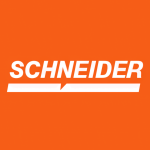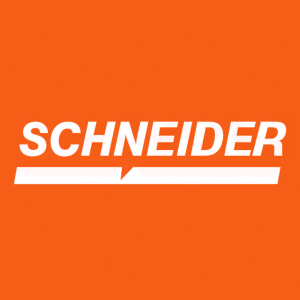Welcome to our dedicated page for Schneider Nation SEC filings (Ticker: SNDR), a comprehensive resource for investors and traders seeking official regulatory documents including 10-K annual reports, 10-Q quarterly earnings, 8-K material events, and insider trading forms.
The Schneider National, Inc. (NYSE: SNDR) SEC filings page on Stock Titan provides access to the company’s official regulatory disclosures as filed with the U.S. Securities and Exchange Commission. As a publicly traded Wisconsin corporation and one of the largest providers of surface transportation and logistics solutions in North America, Schneider uses these filings to report its financial condition, operating performance and material corporate events.
Investors can review annual reports on Form 10-K and quarterly reports on Form 10-Q to understand Schneider’s Truckload, Intermodal, Logistics and other segments, along with details on revenues, operating ratios, capital expenditures, debt levels and cash flows. These reports also describe the company’s multimodal portfolio, use of artificial intelligence, data science and analytics, and the structure of its dedicated services, logistics operations, equipment leasing through Schneider Finance, Inc. and insurance subsidiary activities.
Current reports on Form 8-K document specific events such as quarterly earnings releases, dividend declarations approved by the board of directors and other material developments. For example, Schneider has filed 8-Ks to furnish press releases announcing results for quarters ended June 30 and September 30, and to report board-approved cash dividends on its Class A and Class B common stock.
On this page, Stock Titan surfaces real-time updates from EDGAR and pairs them with AI-powered summaries that explain key points in plain language. Users can quickly see what changed in a new 10-K or 10-Q, how a particular 8-K relates to prior disclosures, and where segment performance or capital allocation trends are discussed. Filings related to executive and director share transactions on Form 4, as well as proxy materials, can also be accessed to analyze ownership and governance.
By using the Schneider National, Inc. filings page, investors gain a structured view of the company’s regulatory history, financial reporting and material events, supported by AI tools that help interpret complex transportation and logistics disclosures more efficiently.
Schneider National, Inc. director and 10% owner Kathleen M. Zimmermann reported a gift of 61,147 shares of Class B Common Stock on January 14, 2026. The transaction is coded as a gift, so no sale price applies. Following this transaction, she directly beneficially owns 620,594 Class B shares. She also reports indirect beneficial ownership of 2,445,095 Class B shares through trusts and 244,350 Class B shares through her spouse.
Schneider National, Inc. director and 10% owner Mary P. DePrey reported a gift of 30,569 shares of Class B common stock on 01/14/2026. Because the transaction was a gift, no price per share applies. Following the transaction, she directly held 609,078 Class B shares and indirectly held 807,100 Class B shares through trusts.
Schneider National, Inc. large shareholder Therese A. Koller reported a gift of 61,138 shares of Class B common stock on January 14, 2026. The transaction was coded as a gift, so no sale price applied. After this transfer, she held 1,821,861 Class B shares directly and an additional 2,025,689 Class B shares indirectly through trusts. This filing simply updates her ownership records and reflects a non-cash transfer rather than an open-market sale.
Schneider National 10% owner Paul J. Schneider reported a series of Class B common stock gifts over multiple dates, most recently on January 14, 2026. That latest transaction involved a gift of 61,153 shares at a stated price of $0.00 per share, reflecting that it was a gift, and left him with 431,916 Class B shares held directly.
The filing also reports earlier gift transactions, including 25,000 shares on December 31, 2025, several gifts on December 16, 2025, and additional gifts in 2024, 2023, and 2022, all coded "G" for gift. In addition to his direct holdings, Schneider is shown with 1,279,870 Class B shares held indirectly by trusts, with the total by trusts calculated as of December 15, 2025, reflecting previously reported transactions.
Schneider National director James R. Giertz reported acquiring the equivalent of 14.22 shares of Class B common stock on 01/12/2026 at a price of $28.76 per share. This was not an open-market trade but resulted from deferred stock units credited through a dividend reinvestment feature of the company’s Director Deferred Compensation Program.
After this automatic dividend reinvestment, Giertz directly beneficially owns 61,730.05 shares of Class B common stock. The deferred stock units are scheduled to be settled in shares of Class B common stock in line with the program’s terms.
Schneider National, Inc. reported an insider transaction involving its EVP - CAO. On 01/02/2026, the officer had 1,239 shares of Class B common stock disposed of at $26.53 per share, coded as an "F" transaction. The filing explains that these shares were automatically withheld to satisfy tax liabilities under a restricted stock unit executive award agreement when restricted stock units vested after the employee reached retirement eligibility. Following this tax withholding, the officer beneficially owns 159,862 shares of Class B common stock directly.
Schneider National, Inc. President & CEO Mark B. Rourke reported an automatic tax withholding transaction in company stock. On 01/02/2026, 4,628 shares of Class B common stock were disposed of at $26.53 per share, reflecting shares withheld to cover tax liabilities when restricted stock units vested after he reached retirement eligibility.
Following this transaction, Rourke beneficially owns 248,447 Class B shares directly and 876,190 Class B shares indirectly through a trust.
Schneider National (SNDR) reported higher revenue but lower profit in Q3 2025. Operating revenues rose to $1,452.4 million from $1,315.7 million, driven by growth in Truckload and Logistics from the Cowan acquisition and higher Intermodal volumes. Income from operations fell to $35.3 million from $43.1 million as salaries, insurance, equipment, purchased transportation, and depreciation increased. Net income was $19.4 million, or $0.11 diluted EPS, down from $30.6 million, or $0.17.
Adjusted EBITDA increased to $148.9 million from $143.8 million. The operating ratio was 97.6% versus 96.7%. Cash was $194.1 million and total debt was $517.5 million, including a $397.5 million delayed‑draw term loan; in October, the company repaid $70.0 million outstanding under its receivables purchase agreement. Year‑to‑date free cash flow was $193.7 million. Schneider finalized preliminary accounting for its $398.6 million Cowan acquisition, adding customer relationships and trademarks and reducing goodwill through measurement‑period adjustments.
Schneider National (SNDR) furnished a press release announcing financial results for the three months ended September 30, 2025. The release is provided as Exhibit 99.1 and is incorporated by reference in Item 2.02.
The information is being furnished, not filed, so it is not subject to Section 18 liabilities of the Exchange Act, and it is not automatically incorporated into other filings. The company also included a forward‑looking statements caution under the Private Securities Litigation Reform Act of 1995.
Schneider National, Inc. (SNDR) announced a quarterly cash dividend for the fourth quarter of 2025 of $0.095 per share on its Class A and Class B common stock.
The dividend will be paid to shareholders of record at the close of business on December 12, 2025, and is expected to be paid on January 12, 2026. This reflects ongoing return of cash to shareholders through regular dividends.


